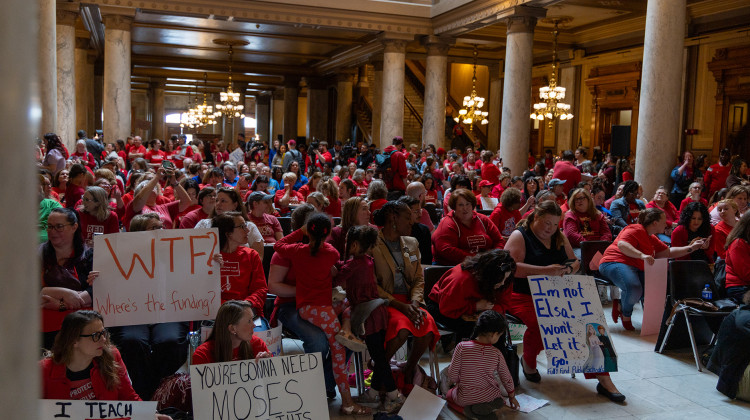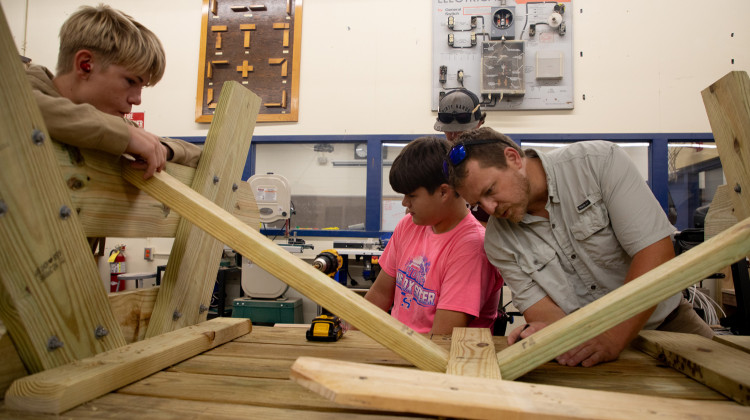
Matchbook Learning at Wendell Phillips is one of 25 innovation charter schools will receive $500 per in-district resident student as part of deal by Indianapolis Public Schools to share some of its 2018 property-tax referendum.
(Elizabeth Gabriel/WFYI)Indianapolis Public Schools approved a plan Thursday to share an estimated $27.5 million of referendum funds with its network of independent charter schools over the next few years. The vote by the school board comes amid growing pressure from families, school leaders and advocates for the property-tax funds to directly benefit students enrolled in innovation charter schools.
IPS is the first district in the state to share these dollars with charter schools in its district.
Innovation school leaders have asked for these funds because a majority of their students comes from within the district's border.
The backstory
In 2018, voters approved the property tax referendum. Afterward, the district's former leadership decided to not share the funds directly with the district's independently operated charter schools. The funds have two parts: $52 million for capitol building improvements and $220 million for teacher pay raises and student services.
Some innovation schools have received a portion of the capitol referendum funds. Other schools benefit from in-kind services, such as transportation, IT and special education services. But state law says innovation charter schools are not able to receive property tax referendum funds directly from voters. Those funds would have to come from a partner school district.
How much schools will receive
Twenty-five innovation charter schools will receive $500 per in-district resident student, which is about 10,000 students. That’s a combined total of roughly $5 million dollars per year until 2026.
But this is significantly less than the amount of referendum funding traditional IPS schools receive of $1,800 per student, according to the district.
A WFYI analysis found the innovation schools will receive between $2,500 and $320,000 each year based on the number of students enrolled in each school who live in the IPS district.
How the plan works
Innovation charter schools will receive the funds twice a year in December and June. The district strongly encourages schools to use the money to provide a 3 percent teacher pay increase to match IPS’ recent teacher pay increase.
Schools will also be required to share data on how they have spent these funds and how they use proceeds from the state’s Charter School Grant — currently a $1,000 per-pupil grant.
The board approved the plan 5-1. Board member Taria Slack (District 5) voted no and Venita Moore (District 2) abstained from the vote over concerns of sharing of funds while the district faces unknown fiscal future.
Community responses
More than 15 parents and school leaders spoke in favor of the district sharing its property tax referendum funds during public comment on Thursday.
Sashah Fletcher is the mother of an eighth grader who attends Edison School of the Arts, an innovation school not included in the approved proposal because it already receives the district’s property-tax revenue. She said all students should be able to benefit from these funds, and that IPS’ decision to share the referendum funds would provide every child with an opportunity to succeed.
“This does require every teacher being valued and making a livable wage no matter their school type,” Fletcher said. “If all teachers were compensated adequately, no matter what type of school they work at, I feel that the district would be able to help better support students and attract a steady and strong workforce.”
But some community members have spoken against sharing the referendum funds due concerns around the district’s budget.
Legal questions
This week State Rep. Ed DeLaney (D-Indianapolis) said IPS may be breaking the law if the referendum funds are shared with the charter schools
State legislation passed in 2020 gave public schools permission to share referendum funds with charter schools. The law says schools are required to say if the referendum funding would be shared with charter schools, and if so, how much funding would be distributed to each charter school.
State officials say that law was intended for future referenda.
A 2016 law about the authority of school corporations states a school district can share referendum funds with innovation charter schools that are in the district's network.
No state agency has yet released a definite response to questions about DeLaney's statement that was issued by the Indiana House Democratic Caucus.
On Thursday the Indiana Department of Local Government Finance referred questions about these issues to the State Board of Accounts. The board did not immediately respond to questions.
Contact WFYI education reporter Elizabeth Gabriel at egabriel@wfyi.org. Follow on Twitter: @_elizabethgabs.
 DONATE
DONATE






 Support WFYI. We can't do it without you.
Support WFYI. We can't do it without you.